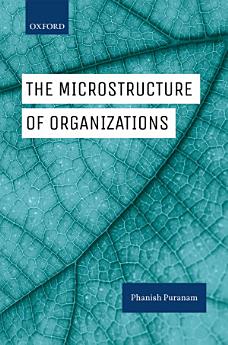The Microstructure of Organizations
জুন ২০১৮ · Oxford University Press
৩.০star
১ টা পৰ্যালোচনাreport
ইবুক
200
পৃষ্ঠা
family_home
যোগ্য
info
reportমূল্যাংকন আৰু পৰ্যালোচনা সত্যাপন কৰা হোৱা নাই অধিক জানক
এই ইবুকখনৰ বিষয়ে
This book synthesizes a decade of research by the author into fundamental issues in organization design. The result is a novel micro-structural perspective on organizations, which aims to both expand and narrow current thinking. The new perspective takes an expansive view on the kinds of phenomena that can be studied in terms of organization design- such as cross-functional teams, strategic partnerships, buyer-supplier relations, alliance networks, mega-projects, post-merger integration, business groups, open source communities, and crowdsourcing, besides traditional concerns with bureaucratic organizations. At the same time, this approach narrows focus by abstracting away from the variety and complexity of organizations to a few fundamental and universal problems of organizing (that relate to how they aggregate their members' efforts), as well as a few reusable building blocks microstructures (which capture common patterns of interaction between members of an organization). The microstructural approach to organizations will be of interest to researchers and PhD students in management, organization science, and strategy.
মূল্যাংকন আৰু পৰ্যালোচনাসমূহ
৩.০
১ টা পৰ্যালোচনা
লিখকৰ বিষয়ে
Phanish Puranam is Roland Berger Chair Professor of Strategy & Organization Design at INSEAD. He is also Academic Director of INSEAD's PhD programme. Phanish's research focuses on organization design and corporate strategy. He has published extensively in internationally reputed academic journals, and has served in senior editorial roles in such journals. His research has won international awards and competitive grants awarded across the social and natural sciences. Phanish obtained his PhD at the Wharton School of the University of Pennsylvania in 2001, and was on the faculty of London Business School till 2012.
এই ইবুকখনক মূল্যাংকন কৰক
আমাক আপোনাৰ মতামত জনাওক।
পঢ়াৰ নির্দেশাৱলী
স্মাৰ্টফ’ন আৰু টেবলেট
Android আৰু iPad/iPhoneৰ বাবে Google Play Books এপটো ইনষ্টল কৰক। ই স্বয়ংক্রিয়ভাৱে আপোনাৰ একাউণ্টৰ সৈতে ছিংক হয় আৰু আপুনি য'তে নাথাকক ত'তেই কোনো অডিঅ'বুক অনলাইন বা অফলাইনত শুনিবলৈ সুবিধা দিয়ে।
লেপটপ আৰু কম্পিউটাৰ
আপুনি কম্পিউটাৰৰ ৱেব ব্রাউজাৰ ব্যৱহাৰ কৰি Google Playত কিনা অডিঅ'বুকসমূহ শুনিব পাৰে।
ই-ৰীডাৰ আৰু অন্য ডিভাইচ
Kobo eReadersৰ দৰে ই-চিয়াঁহীৰ ডিভাইচসমূহত পঢ়িবলৈ, আপুনি এটা ফাইল ডাউনল’ড কৰি সেইটো আপোনাৰ ডিভাইচলৈ স্থানান্তৰণ কৰিব লাগিব। সমৰ্থিত ই-ৰিডাৰলৈ ফাইলটো কেনেকৈ স্থানান্তৰ কৰিব জানিবলৈ সহায় কেন্দ্ৰত থকা সবিশেষ নিৰ্দেশাৱলী চাওক।





